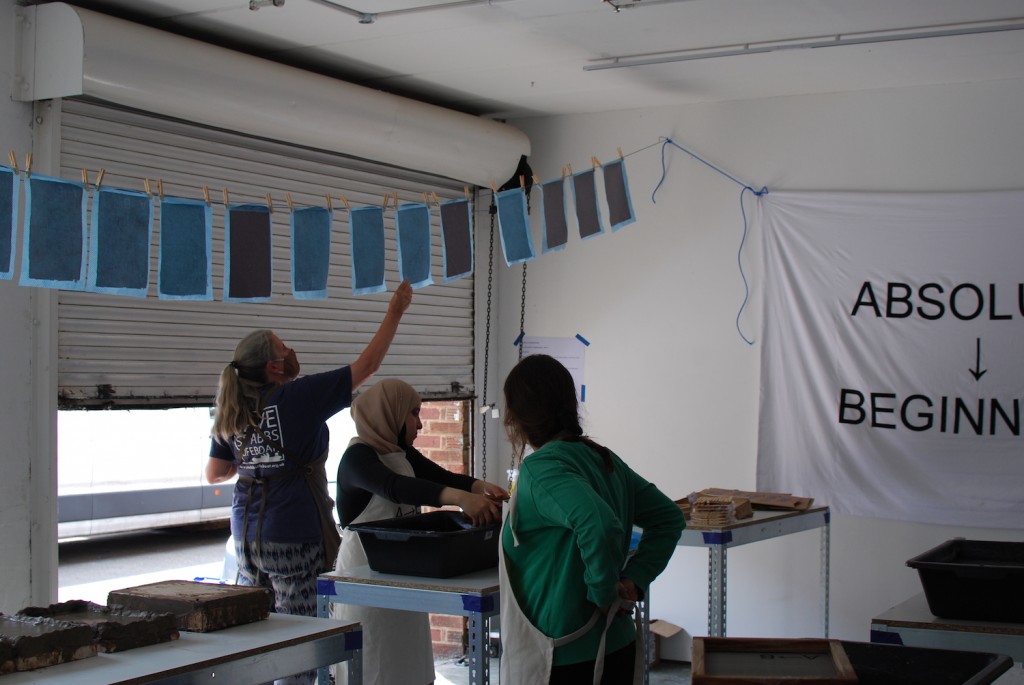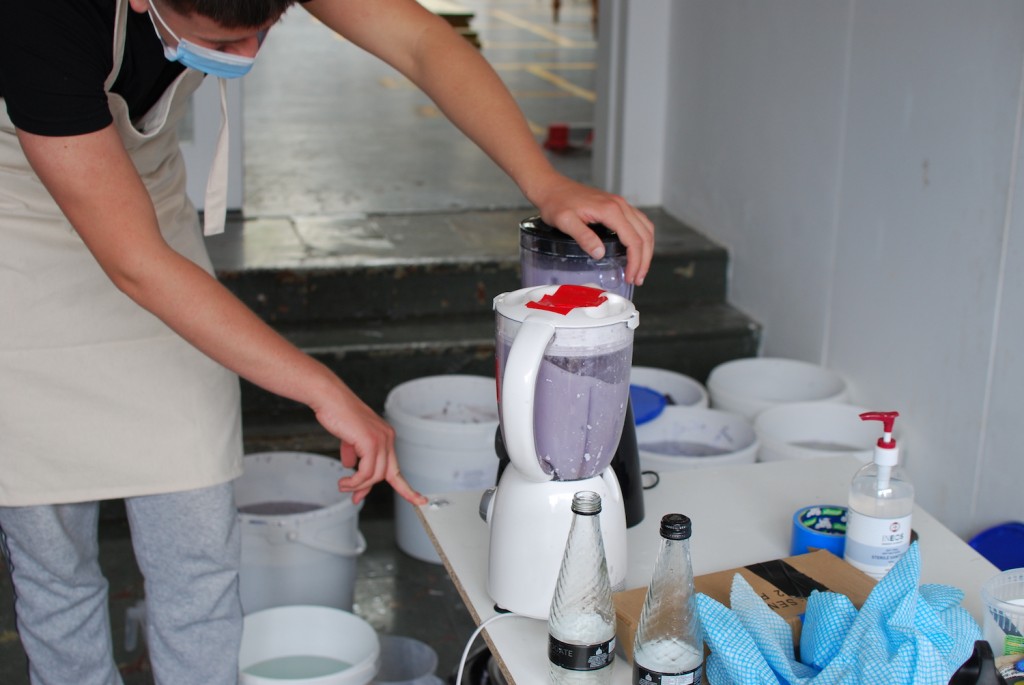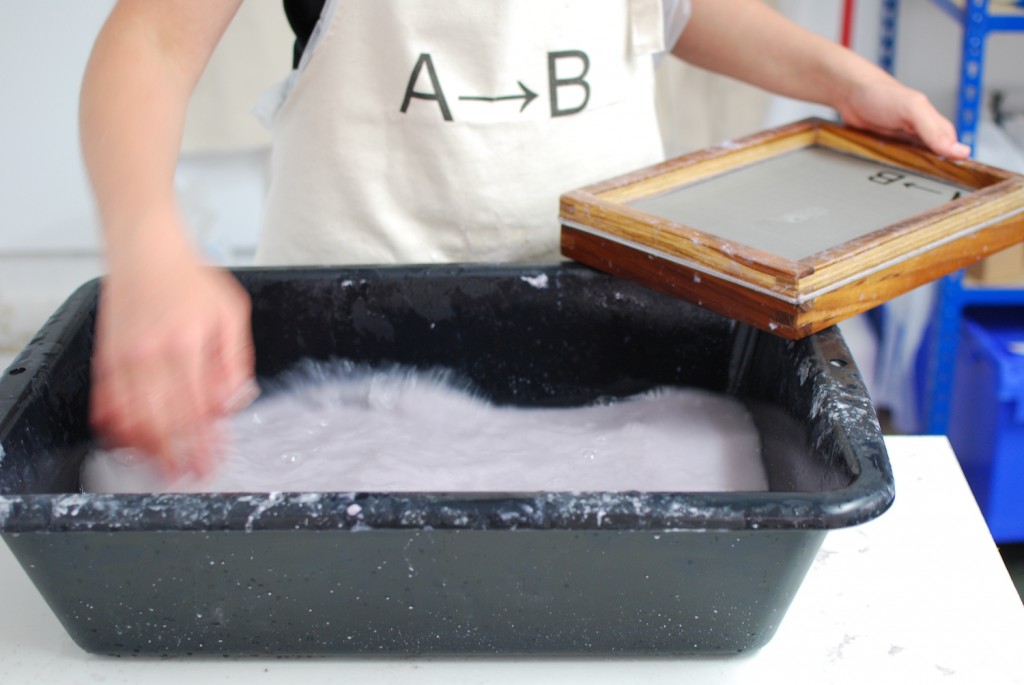
The first product we made at Absolute Beginners was A4 paper. Why A4? A few reasons.
1. Because it’s fundamental to communication, and an international standard – that is, it’s used everywhere on Earth.
2. Because it used to be made at this factory in Park Royal, by Harold Wesley and his workers:

↑The Wesley paper factory, on Acton Lane, Park Royal.
3. Because it’s surprisingly low-tech – you can make it by hand in pretty much the same way as it was first made in China.

↑Traditional paper making in China, using pulped bamboo.
4. And because it’s abundant. Paper is 100% recyclable. There’s enough in the filing cabinets of London to last a thousand years.
Our raw material was bags of shredded confidential waste sourced from the estate, along with leftover prints from a local arts festival (which gives our paper its pinky colour).

↑Bags of shredded paper waste, found at the side of the road.
The workshops were led by the amazing Lucy Baxandall, from Tidekettle Paper. Because of the Covid situation, we decided to run the workshops online, with each young person getting a box full of all the kit they needed to make paper at home.
These were delivered thusly:

↑A reusable blue pastic crate containing all the materials the youth need, ready to be shipped.

↑Box-in-transit, on a Pedal Me bike. 10/10 would recommend for all your courier needs.

↑Box-in-transit on our own Absolute Beginners bike trailer. 7/10, hard work but rewarding.

↑Box in transit in a transit van.
The beginners were Elton, Jana, Jasmin, Mariam, Pascal, and Tim. Over four Saturday sessions, Lucy taught them how to make paper in their front rooms and on their kitchen tables, over zoom. We covered:
→ how to soak the paper;
→ how to pulp the soaked paper in blenders, and add this pulp to the vat (big tub);
→ how to use the mould and deckle to ‘pull’ a sheet out of the water, and then ‘couch’ it (pronounced cooch) onto a j-cloth, in one easy action;
→ how to make a press out of plywood and g-clamps, to get the water out;
→ then how to dry it on a line at home.

↑Lucy Baxandall introducing the blender on zoom.

↑One of the young people shows us how their pulp is looking.

↑Lucy demonstrates how to 'pull' the paper, using a mould and deckle to scoop some pulp out of the vat.

↑One of the Beginners' first attempts. Lucy is v impressed.
(It was pretty weird doing this online, and blending with the mics off. What should have been busy and noisy was silent).
Despite being at the other end of a screen, all the young people managed to make a sheet. We were impressed.

↑Everyone checks in to show how it's going.

↑The young people share their first attempts once they've dried.
In week three, we talked about branding and marketing. Our resident community business branding expert Cam Jarvis led a session asking: ‘What is it? Who is it for? Why would anyone choose it?’ Our young people answered: ‘it’s A4 paper, it’s 100% recycled, 100% handmade and 100% homemade, in the bedrooms and kitchens of north-west London’. Pascal Pelosi-Campbell suggested a name for the paper too: ABSOLUTE PAPER.
Lucy also showed the young people how to make a watermark – to show who made the paper and where. Historically, this was done using metal or wooden shapes, wired to the mesh of the paper ‘mould’. We’re using gaffer tape as a low-tech solution.

↑We experiment with watermarks. Some of the young people make them based on their initials.

↑Some do stars.

↑This is how the watermark comes out when it's held up to the light. Captured via zoom. Incredible.

↑We experiment with the project's logo as the watermark, too. Just because it's a low-tech future doesn't mean you can compromise on the graphic design.
In the last workshop, the young people trimmed and photographed their paper, in a DIY photoshoot over zoom. Here’s what it looked like:

↑Photoshoot #1 - one of the young people's paper on a black background. Austere.

↑Photoshoot #2 - two different types of home-made paper, arranged on a table cloth.

↑Photoshoot #3 - a sheet of paper held up, minimal style.

↑Photoshoot #4 - two types of paper, fanned out.

↑Photoshoot #5 - a few different examples of home-made paper, with watermark visible, and bonus pot plant.
One of the young people described the paper they produced as ‘strange, but in a good way’. This we liked.
Finally, a few months later, we were able to meet in real life to go into production. Over three days at Queensrollahouse, we brought the Absolute Beginners together to make, press, dry and trim over 200 sheets.

↑Our beginners come together In Real Life to produce some paper in bulk. The paper is drying above their heads.

↑Lucy shows the young people how to press the water out of the paper they make, using a DIY press made from plywood and G-clamps. The water pours out of the sides.

↑Buckets of recycled paper, waiting to be pulped.

↑Paper production in progress. This is what we had in mind since the start of 2020.

↑Live pulping shot.

↑Adding pulp to the vat and stirring. The wooden thing is the mould and deckle, used to 'pull' the pages.
Quality Control was based on whether you could see the A→B watermark clearly. We graded the sheets into firsts, seconds and thirds, accordingly.

↑Quality control.
ABSOLUTE PAPER is:
→ 100% RECYCLED
→ 100% HANDMADE
→ 95% OFF-GRID
Suggested use: for sentimental letters, historic documents, birthday cards and treasure maps.

↑The finished paper. A to B logo clearly visible. Trimmed to slightly less than A4.
DISCLAIMERS:
→ All the young people were paid London Living Wage for their time on the project, which was £10.85 per hour.
→ Absolute Paper is 95% off-grid because we used an electric blender to blend the pulp. We could probably have built one on the back of a bike, but had neither the time nor the knowledge.
→ Our paper is only A4-ish, because the ‘deckle’ (rough) edges of the paper were too raggedy to look industrial, so we cut them off.
CREDITS:
Workshop Leader → Lucy Baxandall.
Absolute Beginners → Elton, Jana, Jasmin, Mariam, Pascal, and Tim.
Youth Engagement → Cam Jarvis.
Date → April 2021.